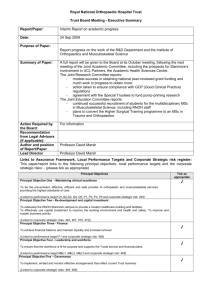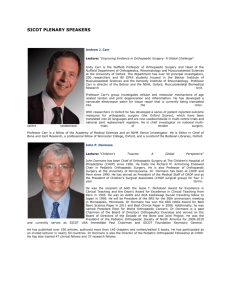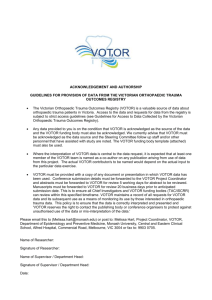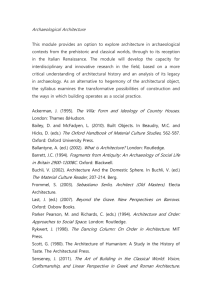National Institute for Health and Research (NIHR
advertisement
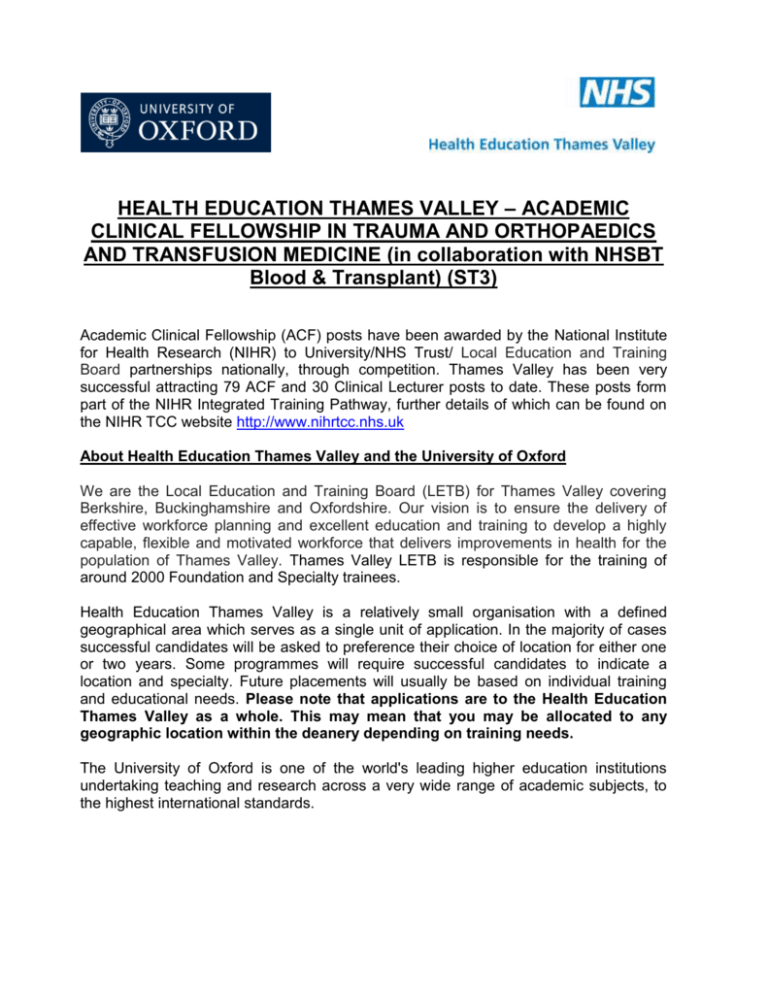
HEALTH EDUCATION THAMES VALLEY – ACADEMIC CLINICAL FELLOWSHIP IN TRAUMA AND ORTHOPAEDICS AND TRANSFUSION MEDICINE (in collaboration with NHSBT Blood & Transplant) (ST3) Academic Clinical Fellowship (ACF) posts have been awarded by the National Institute for Health Research (NIHR) to University/NHS Trust/ Local Education and Training Board partnerships nationally, through competition. Thames Valley has been very successful attracting 79 ACF and 30 Clinical Lecturer posts to date. These posts form part of the NIHR Integrated Training Pathway, further details of which can be found on the NIHR TCC website http://www.nihrtcc.nhs.uk About Health Education Thames Valley and the University of Oxford We are the Local Education and Training Board (LETB) for Thames Valley covering Berkshire, Buckinghamshire and Oxfordshire. Our vision is to ensure the delivery of effective workforce planning and excellent education and training to develop a highly capable, flexible and motivated workforce that delivers improvements in health for the population of Thames Valley. Thames Valley LETB is responsible for the training of around 2000 Foundation and Specialty trainees. Health Education Thames Valley is a relatively small organisation with a defined geographical area which serves as a single unit of application. In the majority of cases successful candidates will be asked to preference their choice of location for either one or two years. Some programmes will require successful candidates to indicate a location and specialty. Future placements will usually be based on individual training and educational needs. Please note that applications are to the Health Education Thames Valley as a whole. This may mean that you may be allocated to any geographic location within the deanery depending on training needs. The University of Oxford is one of the world's leading higher education institutions undertaking teaching and research across a very wide range of academic subjects, to the highest international standards. 2 The Academic Clinical Fellow (ACF) in Trauma and Orthopaedics. The post holder will become part of the Nuffield Department of Orthopaedics, Rheumatology and Musculoskeletal Sciences (NDORMS) Graduate School based at the Nuffield Orthopaedic Centre and the Botnar Research Centre. The position will be integrated into Health Education Thames Valley Trauma and Orthopaedics (T&O) training programme. This post is in conjunction with NHS Blood & Transplant and the post holder will be supported in developing a project a relevant project in Transfusion Medicine This training post will be for 3 years. At the end of the 3 year fellowship, the successful applicant will return to Health Education Thames Valley’s T&O ST Clinical Training Programme retaining their National Training Number (NTN). They may be able to take out of programme research time to complete a further higher degree at Oxford or to continue on the clinical programme to acquire their clinical training and competences working towards obtaining a pass in the T&O Intercollegiate Examination and working towards a Certificate of Completion of Training (CCT). Training Objectives The main objectives of the programme will be to provide: An entry point for doctors aspiring to an academic research based career in Trauma and Orthopaedics; ii) A placement within a research department (Transfusion Medicine) to develop a project and funding to progress to a full time research post after 3 years in order to undertake a DPhil at Oxford University iii) Appropriate clinical surgical training and learning to enable progression from ST3 towards a CCT. i) Clinical Training versus Academic Time This is a 75% clinical post with a 25% academic component. This 25% of research time will be averaged out over the three years but will mainly take place in either a 6 or 9 month block of full time research. This research block will not be in the first year of the post. Candidates will be expected to have excellent core skills in Trauma and Orthopaedics and to work as an integral part of a clinical team throughout the training period. Agreement has been provided by the Oxford Programme Director for T&O for one of the present NTNs available to be transformed into a NTN (A). The post holder will rotate through the Oxford Hospitals and District Regional Orthopaedic Units within Thames Valley during their clinical posts. The successful applicant will have training assessments as part of the Annual review of Competence ARCP) programme. In additional academic assessment of progress will be conducted in line with Academy of Medical Sciences guidelines for the ARCP for Speciality Registrars undertaking joint clinical and academic training programmes. The ACF will have desk space for their research within the NDORMS Graduate School/Botnar Research Centre. There is an established induction process for new 3 researchers joining the department, coordinated by the NDORMS Post Graduate Research Committee; this includes training in research methodology, statistics, clinical trials, bioengineering and molecular and cellular sciences. The ACF will have access to both the weekly Regional Orthopaedic Training and Botnar Research Seminar programmes. Research Academic Supervisor: Professor Siôn Glyn-Jones is the Research Supervisor for T&O ACFs although this post will also have supervision within Transfusion Medicine (see below). Professor Siôn Glyn-Jones is a theme leader for hip research at NDORMS, focusing on the epidemiology, pathogenesis and treatment of osteoarthritis in the lower limb. The ACF would be directly responsible to their Research Academic Supervisor. The research programme for the ACF will be set out at the start of the post and agreed between the ACF and the Research Academic Supervisor. Oxford T&O Health Education Thames Valley’s Programme Director: Mr Andrew Wainwright, Consultant Orthopaedic Surgeon, NOC Director of Clinical Academic Training: Mr Jonathan Rees, Head of Education NDORMS Teaching Opportunities The ACF at NDORMS will be expected to contribute to the education of the Oxford University Medical School 5th year Musculo-skeletal students. This involves regular seminar teaching of the groups of students who rotate through the course every 8 weeks. The teaching is shared between the established Clinical Lecturers and a number of Honorary Student Clinical Lecturers, with the ACF joining this team. Selection Criteria There are a number of nationally set selection criteria. Applicants must also be qualified for specialty training at ST3 level or above. They should also demonstrate ability in the research process and that they have outstanding potential for development as a clinical academic. The Nuffield Department of Orthopaedics, Rheumatology and Musculoskeletal Sciences The Nuffield Department of Orthopaedics, Rheumatology and Musculoskeletal Sciences is based primarily on the Nuffield Orthopaedic Centre (NOC) site. The 20 acre NOC campus is integrated with most Oxford biomedical research institutes and departments. The resulting facility enables basic musculoskeletal research, translational research, clinical trials and healthcare provision to be undertaken in close proximity. Bibliometric analysis confirms the pre-eminent research output of the department (Rand Corporation 2007, www.nihr.gov.uk ). The NDORMS is embedded within the wider campus of the Oxford University Hospitals and the University of Oxford. This research environment is integrated with the Institute of Biomedical Engineering, the Henry Wellcome Building for Genomic Medicine, the Richard Doll Epidemiology Building, the Oxford Centre for Diabetes Endocrinology and 4 Metabolism and the Henry Wellcome Building for Molecular Physiology among others. This environment provides the optimum setting for basic research to support the department’s research activities. The NOC itself occupies a new hospital (2007) and is the largest specialist orthopaedic, rheumatology and rehabilitation unit in the UK. Facilities include 100 beds, 8 operating theatres, a 3T, a 1.5T and an open 1.5T MRI scanner. The Orthopaedic Trauma Service at the John Radcliffe Hospital has 54 adult beds and a Children’s Hospital and supports a regional specialist trauma network. Botnar Research Centre (Oxford University Institute for Musculoskeletal Sciences) The Botnar Research Centre opened in April 2002. It was funded by charitable donation, (£5m) and currently houses 100 research staff. In November 2012 with a further £5m donation, Botnar 2 opened and doubled the size of the Botnar Research Centre. National Institute for Health and Research (NIHR) Musculoskeletal Biomedical Research Unit Created in April 2008 this is one of only three such units in the UK and was funded after a competitive international review process. The unit comprises four principle research groups focussing on translational musculoskeletal research into prevention of disease, tissue engineering, joint replacement surgery and surgical technology and skill. Within the unit is a research dedicated imaging suite with biplanar radiography and ultrasound. Kadoorie Centre The Research Unit in the Kadoorie Centre, linked to the John Radcliffe Trauma Unit, has expanded considerably since its inception in 2003. It not only occupies 50% of the research space in the Kadoorie Centre, but now has two statutory professors (Orthopaedic Trauma Surgery and Trauma Rehabilitation) is supported by three Research Nurses (involved in quantitative and qualitative clinical research), two audit coordinators, one DPhil student and secretarial support. The Centre’s role is to improve the care of the critically ill patient by staff training, and targeted research and development. The research centre is shared with the Intensive Care Society promoting cross-fertilisation. Current research studies are supported by grants from the Oxford Biomedical Research Centre, the National Institute of Health Research (NIHR), Health Technologies Assessment programme (HTA) and commercial sources. There is a strong collaboration between the Kadoorie Centre and the Warwick Clinical Trials Unit and Public Health economists at Glasgow University. Transfusion Medicine This post is in conjunction with Transfusion Medicine. Blood transfusions are commonly administered in the context of surgery, but there is accumulating evidence that transfusions of blood may be associated with adverse effects. The mechanisms for postulated transfusion-associated organ injury are unclear, and have included pathological changes in red cell units during storage. 5 There are excellent research facilities in Transfusion Medicine in Oxford and an established track record of delivering high quality research in the area of transfusion practice in critical care. The successful applicant will join the systematic review and clinical trials group led by Professor Murphy and Dr Stanworth based in NHS Blood and Transplant. The primary objective of the group is to strengthen the evidence base for the effective and safe practice of transfusion medicine. The need to achieve this objective was highlighted in successive ‘Better Blood Transfusion’ Health Service Circulars and other national recommendations. From 2000, a supporting infrastructure for clinical research has been established to meet this objective in Oxford, including a Systematic Reviews Initiative (SRI) supported by the Centre for Statistics in Medicine (University of Oxford), a Clinical Trials Unit within NHS Blood and Transplant, and linkage to the National Comparative Audit of Blood Transfusion programme (supported by the Royal College of Physicians Clinical Evaluation and Effectiveness Unit). The group has support from the Oxford Haemophilia Centre for novel laboratory studies of haemostasis. Specific current and on-going research activities include: A multicentre international randomised controlled trial to study whether patients receiving "fresh" blood up under 7 days storage age do better compared to those given standard aged blood is just beginning (ABLE) A multicentre randomised controlled trial of restrictive v. liberal red cell transfusions in acute upper gastro-intestinal bleeding A multicentre observational study to understand the haemostatic derangements in admissions to critical care (ISOC-2) A UK wide study of outcomes in trauma patients receiving multiple transfusions, including use of viscoelastic devises A pilot trial of early cryoprecipitate use in trauma A multicentre randomised controlled trial of anti-fibrinolytics in patients with acute gastro-intestinal bleeding (HALT-IT). The development of a completely paperless electronic transfusion process including blood ordering/prescription and ‘decision support’ allowing detailed audit of the use of blood and the whole transfusion process In many of the group’s clinical studies, an economic cost evaluation is included as it is important to know whether the studies, or the methods used to improve the quality of care, actually represent good value for money. The research component of this ACF will focus on one of the following areas in orthopaedics and transfusion medicine: The effectivess of measures to minimise the use of transfusion in elective surgery in adults and children e.g. surgical technique, tranexamic acid, fibrin sealants, cell salvage, either alone or in combination Use of the ‘end-to-end’ electronic process for transfusion to provide data on blood usage and ‘decision support’ for optimal transfusion practice in elective surgery 6 Comparative studies of bone graft alternatives for elective orthopaedic surgery The optimal transfusion management of patients with coronary artery disease undergoing elective surgery The management of haemostatic derangements and DIC in association with bleeding complications in elective surgical patients Staffing Structure in the Department The following are the key academic staff in the Department and their research interests: Professor Andy Carr - Nuffield Professor of Orthopaedic Surgery and Head of Department. Director NIHR BRU. Patient reported outcome measures (the Oxford Scores). Molecular and cellular mechanisms in rotator cuff tendon tear. Use of novel materials (silk) to augment rotator cuff tear repair. Multi-centre Randomised Clinical Trials of open and minimally invasive shoulder surgery. Development of the Oxford Shoulder replacement. Professor Sion Glyn-Jones – Profesor of Orthopaedic Surgery. Clinical trials, theme leader for hip research. Professor Jonathan Rees – Professor in Orthopaedic Surgery and Musculoskeletal Science Head of Education Director of the Oxford Centre for Orthopaedic Surgical Skills. Shoulder pain, shoulder surgery, outcomes and surgical skills Professor Andrew Price - Clinical Reader in Orthopaedic Surgery and Musculoskeletal Science Tissue regeneration, biological therapy and minimally invasive surgery (injectable therapies for knee OA, chondrocyte transplantation in knee OA). Professor Cyrus Cooper - Professor of Musculoskeletal Epidemiology University of Oxford and Director MRC Epidemiology Resource Centre, Southampton. Director of the Botnar Research Centre. Prevention of osteoarthritis and osteoporosis including role of vitamin D. Norman Collisson Professor of Musculoskeletal Science – currently vacant Professor Nick Athanasou - Professor of Osteoarticular Pathology Osteoclast and osteoblast cell biology. Professor Paul Wordsworth - Professor of Rheumatology Genetic studies in Inflammatory joint conditions and skeletal dysplasias. Clinical trials in inflammatory joint disorders. Professor Keith Willett - Professor of Orthopaedic Surgery 7 Founder and Director of the Kadoorie Centre for Trauma Research. Trauma Surgery Outcomes. National Trauma Network TARN. Public and Government Policy in Trauma Care. Professor Sallie Lamb - Professor of Trauma Rehabilitation (50% contract) Director of Clinical Trials Unit, University of Warwick. National Clinical Trials in Trauma Care. Professor Christopher Lavy - Professor of Tropical Orthopaedic Surgery Management of club foot in sub-saharan Africa. Clinical trials in Africa. Professor David Murray - Professor of Orthopaedic Surgery Patient reported outcome measures (the Oxford scores). Bioengineering. Development of the Oxford Knee, Radiostereometric and kinematic assessment to predict early failure of joint replacement. Professor Udo Oppermann - Professor of Musculoskeletal Sciences Deputy Director of the Botnar Research Centre. Professor of Orthopaedic Engineering - (jointly with the Department of Engineering Science) currently vacant Professor Nigel Arden - Professor in Rheumatic Diseases and Clinical Reader Epidemiology of osteoarthritis and osteoporosis. Clinical trials in OA (Vitamin D). Prevention of osteoarthritis and osteoporosis and the use of Vitamin D. Development of a clinical risk tool and biomarkers for use in clinical trials. Associate Professor Afsie Sabokbar - Director of Postgraduate Studies. Osteoclast and Osteoblast cell biology. Professor David Beard - RCUK Lecturer in Musculoskeletal Science Chairman Postgraduate Studies Committee. Clinical Trials in joint Replacement Surgery. Professor Kassim Javaid - Senior Lecturer in Metabolic Bone Disease and Musculoskeletal Science. Rheumatology undergraduate and postgraduate tutor. Prevention of osteoarthritis and osteoporosis including role of vitamin D. Main Conditions of Service Appointments to this programme are subject to the Terms and Conditions of Service (TCS) for Hospital Medical and Dental Staff (England and Wales). In addition appointments are subject to: Applicants having the right to work and be a doctor or dentist in training in the UK Registration with the General Medical Council 8 Pre-employment checks carried out by the Trust HR department in line with the NHS employment check standards, including CRB checks and occupational health clearance. The employing Trust’s offer of employment is expected to be on the following nationally agreed terms: Hours – The working hours for junior doctors in training are now 48-hours (or 52hours if working on a derogated rota) averaged over 26 weeks (six months). Doctors in training also have an individual right to opt-out if they choose to do so, but they cannot opt-out of rest break or leave requirements. However, the contracts for doctors in training make clear that overall hours must not exceed 56 hours in a week (New Deal Contract requirements) across all their employments and any locum work they do. http://www.nhsemployers.org/your-workforce/need-to-know/european-working-timedirective Pay – you should be paid monthly at the rates set out in the national terms and conditions of service for hospital medical and dental staff and doctors in public health medicine and the community health service (England and Wales), “the TCS”, as amended from time to time. The payscales are reviewed annually. Current rates of pay may be viewed at http://www.nhsemployers.org/your-workforce/pay-and-reward/pay/pay-and-conditionscirculars/medical-and-dental-pay-and-conditions-circulars Part time posts will be paid pro-rata Pay supplement –depending upon the working pattern and hours of duty you are contracted to undertake by the employer you should be paid a monthly additional pay supplement at the rates set out in paragraph 22 of the TCS. The current payscales may be viewed at http://www.nhsemployers.org/your-workforce/pay-and-reward/pay/pay-andconditions-circulars/medical-and-dental-pay-and-conditions-circulars The pay supplement is not reckonable for NHS pension purposes. The pay supplement will be determined by the employer and should be made clear in their offer of employment and subject to monitoring. Pension – you will be entitled to join or continue as a member of the NHS Pension Scheme, subject to its terms and rules, which may be amended from time to time. If you leave the programme for out of programme experience you may have a gap in your pension contributions. More information can be found at http://www.nhsbsa.nhs.uk/pensions Annual Leave – your entitlement to annual leave will be five or six weeks per annum depending on your previous service/incremental point, as set out in paragraphs 205206 of the TCS. The TCS may be viewed at http://www.nhsemployers.org/your-workforce/pay-and-reward/nhs-terms-andconditions/junior-doctors-dentists-gp-registrars/junior-doctors-terms-and-conditions-ofservice-and-associated-documents 9 Sick pay – entitlements are outlined in paragraph 225 of the TCS. Notice –you will be required to give your employer and entitled to receive from them notice in accordance with paragraphs 195-196 of the TCS. Study Leave –the employer is expected to offer study leave in accordance with paragraphs 250-254 of the TCS. Local policy and procedure will be explained at induction. Travel Expenses – the employer is expected to offer travel expenses in accordance with paragraphs 277-308 of the TCS for journeys incurred in performing your duties. Local policy and procedure should be explained at induction. Subsistence expenses – the employer is expected to offer subsistence expenses in accordance with paragraph 311 of the TCS. Local policy and procedure should be explained at induction. Relocation expenses – the employer will have a local policy for relocation expenses based on paragraphs 314 – 315 of the TCS and national guidance at http://www.nhsemployers.org/PayAndContracts/MedicalandDentalContracts/JuniorDo ctorsDentistsGPReg/Pages/DoctorsInTrainingJuniorDoctorsTermsAndConditions150908.aspx You are advised to check eligibility and confirm any entitlement with the employer before incurring any expenditure. Pre-employment checks – all NHS employers are required to undertake preemployment checks. The employer will confirm their local arrangements, which are expected to be in line with national guidance at http://www.nhsemployers.org/your-workforce/recruit/employment-checks/nhsemployment-check-standards Professional registration – it will be a requirement of employment that you have professional registration with the GMC/GDC for the duration of your employment. Though the post is covered by NHS Indemnity, you are strongly advised to register with the MPS for professional indemnity. Health and Safety – all employers have a duty to protect their workers from harm. You should be advised by the employer of local policies and procedures intended to protect your health and safety and expected to comply with these. Disciplinary and grievance procedures – the employer will have local policies and procedures for dealing with any disciplinary concerns or grievances you may have. They should advise you how to access these, not later than eight weeks after commencement of employment. Educational Supervisor – the employer or a nominated deputy (usually the Director of Medical Education) will confirm your supervisor on commencement. 10 General information on the LETB’s management of Specialty Training programmes, including issues such as taking time out of programme and dealing with concerns or complaints, is available at www.oxforddeanery.nhs.uk and in the national ‘Gold guide’ to Specialty Training at http://specialtytraining.hee.nhs.uk/. Please ensure that you inform Health Education Thames Valley of any changes to your contact details. 7 October 2014
